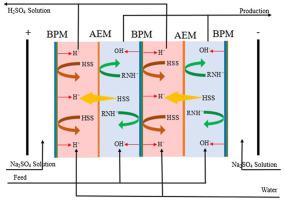Journal of Membrane Science ( IF 8.4 ) Pub Date : 2021-12-28 , DOI: 10.1016/j.memsci.2021.120213 Zhiwei Zhou 1 , Yuqing Lin 1 , Yan Jin 1 , Kecheng Guan 2 , Hideto Matsuyama 2 , Jianguo Yu 1

|
Traditional resin exchange processes for the removal of heat-stable salt (HSS) from lean amine solutions have limited efficiency, and require large amount of alkali for regeneration, causing a serious negative impact on the sustainable environmental development. In this study, a new bipolar membrane electrodialysis (BMED) process was proposed to replace the original resin-based method for the removal of HSS from practical lean amine liquids (from a natural gas factory of PetroChina Company). The experimental conditions of current density, volumetric ratio, HSS concentration, and etc., were systematically investigated. It was found that a high HSS removal efficiency of up to 95.7% with an extremely low loss rate of the organic amine of down to 1.39% can be obtained, under the optimal current density of 60 mA/cm2. A continuous operation verified the long-term stability of BMED for a high-efficiency HSS removal rate of up to 80.3% after a 600-h duration. From the findings in this study, we develop a conceptual exploration describing the BMED process for the separation of HSS from practical desulfurization wastewater, beyond the lean amine liquids, offering a guidance for their potential industrial applications.

































 京公网安备 11010802027423号
京公网安备 11010802027423号